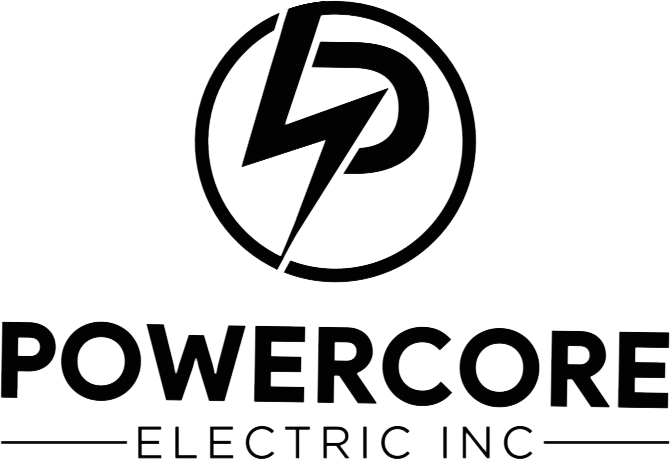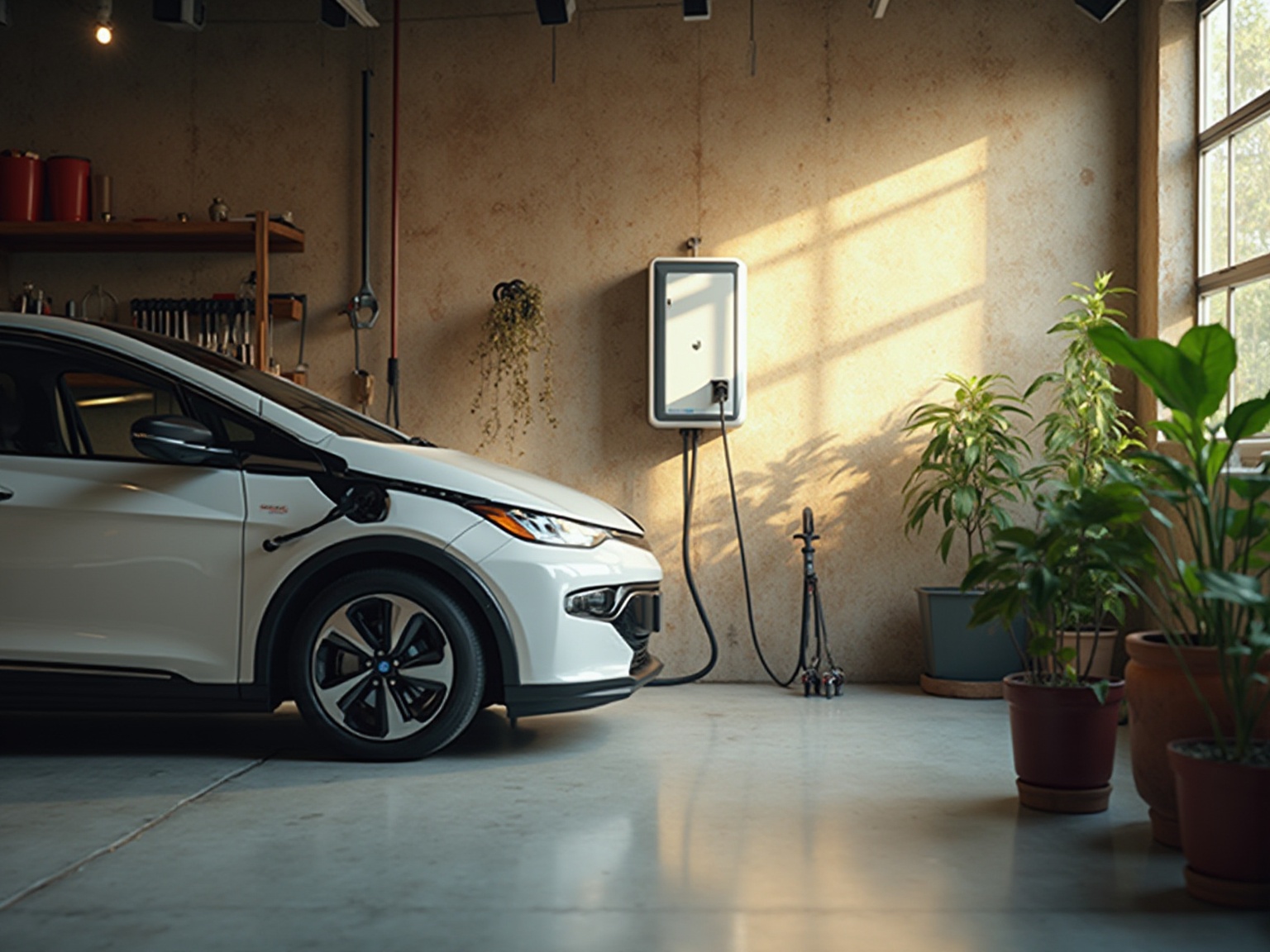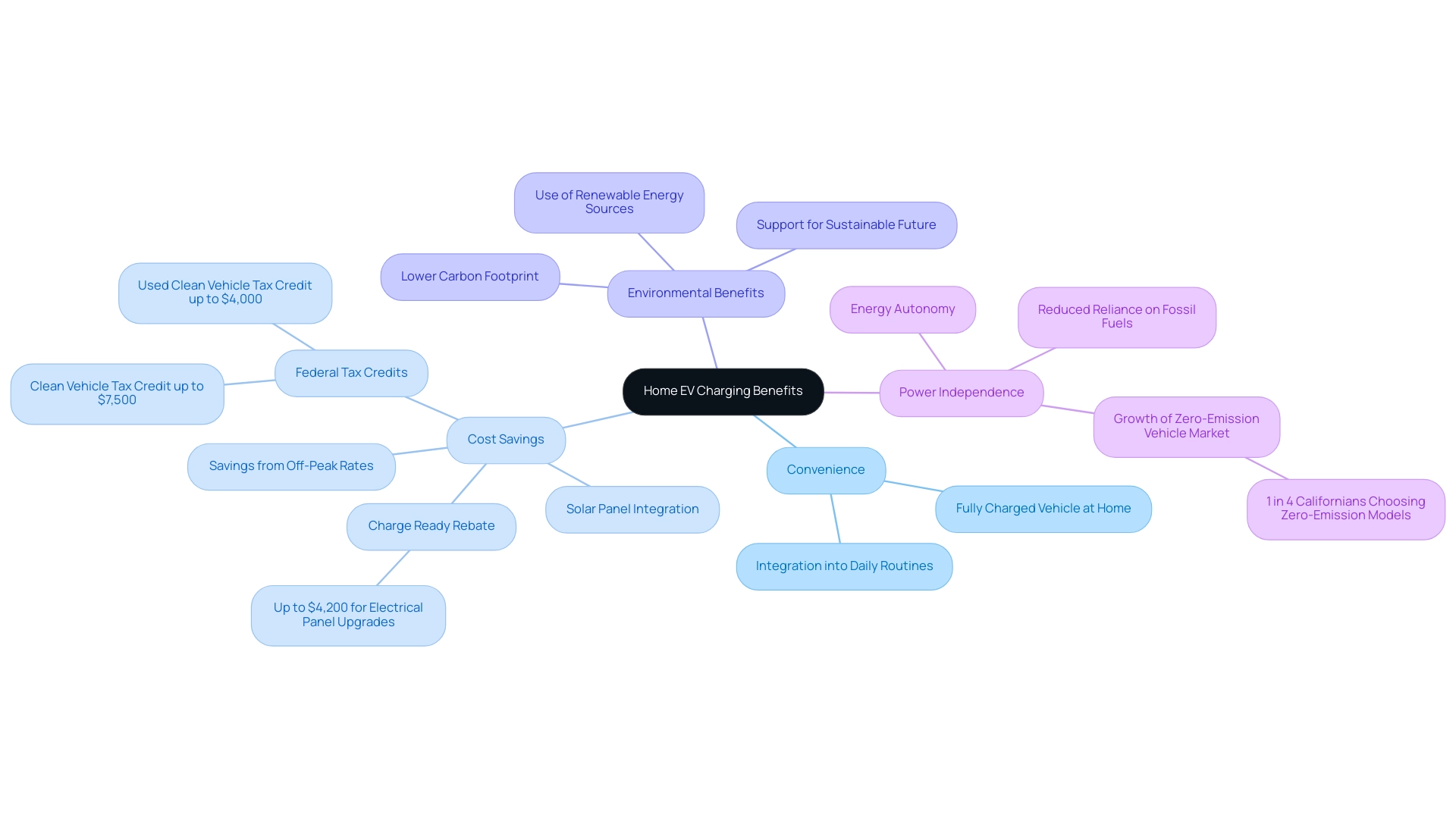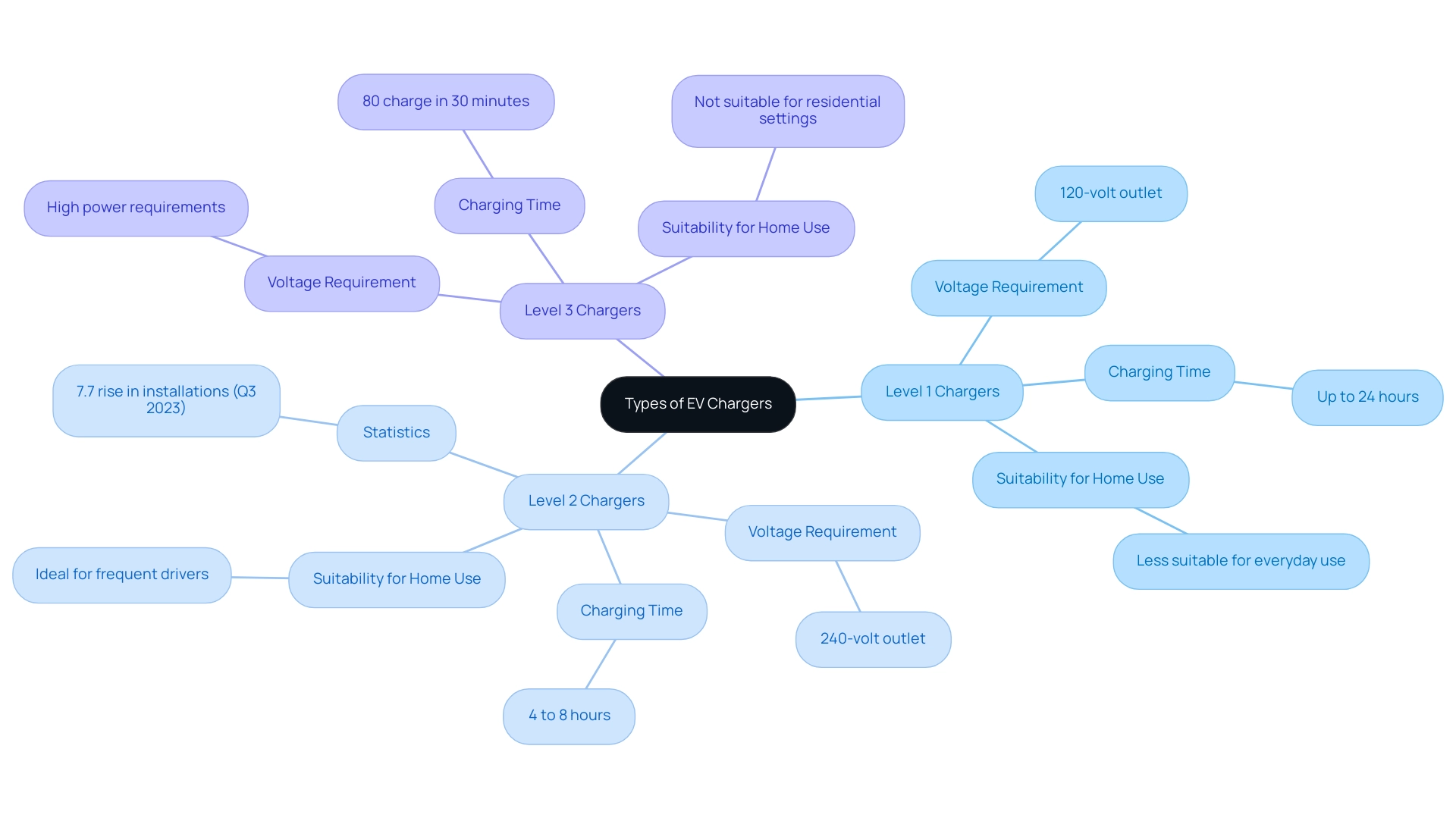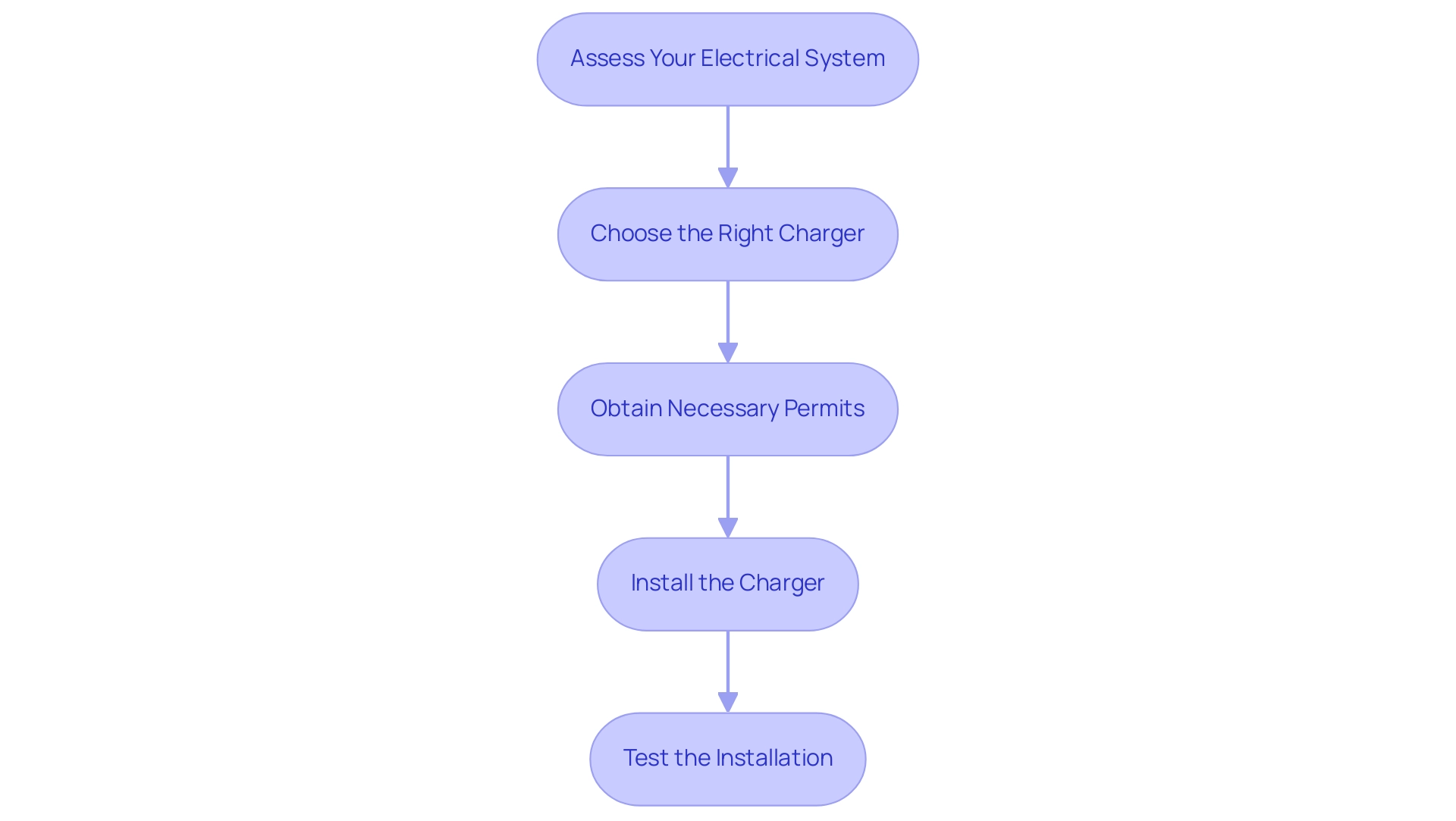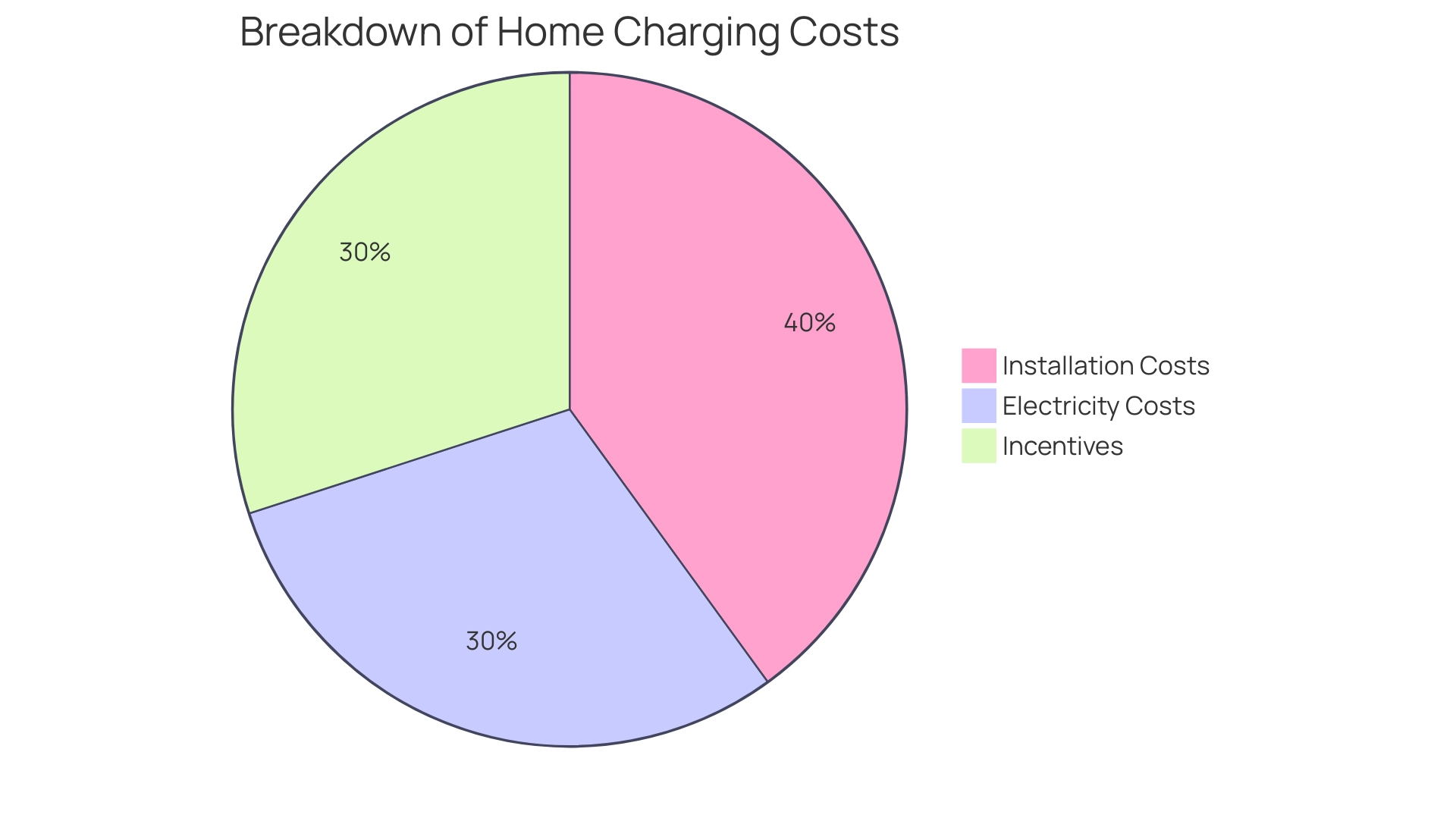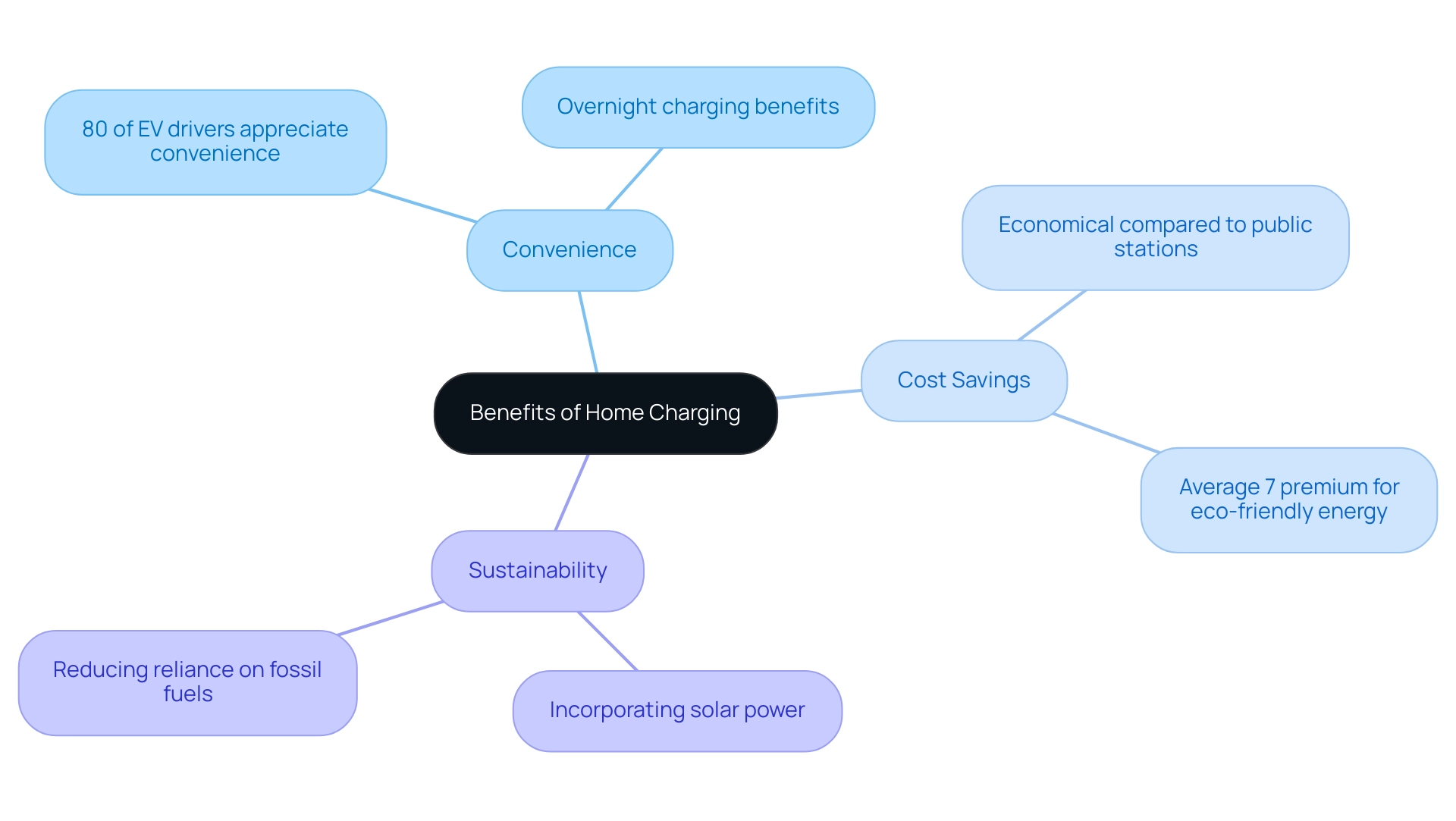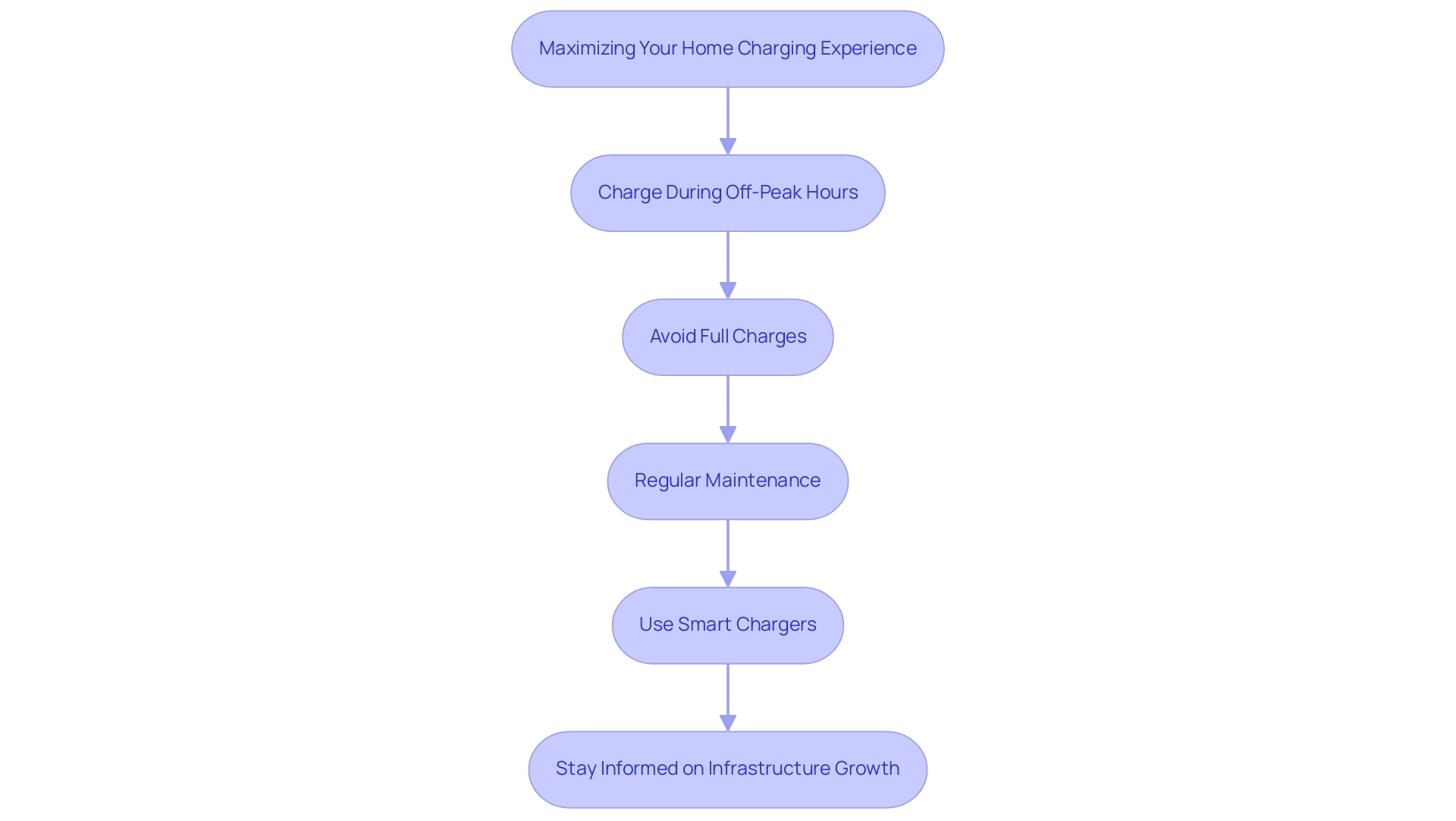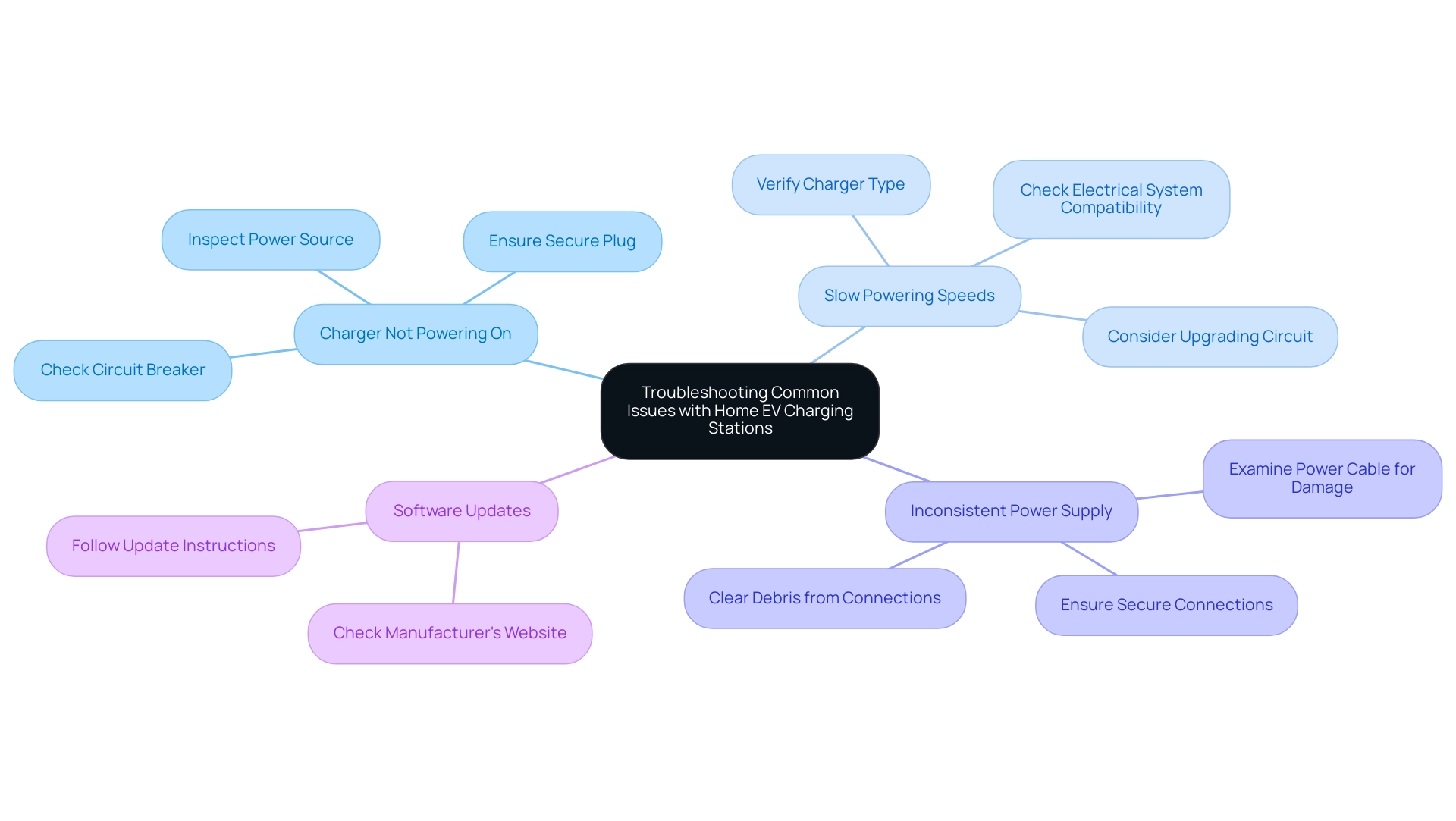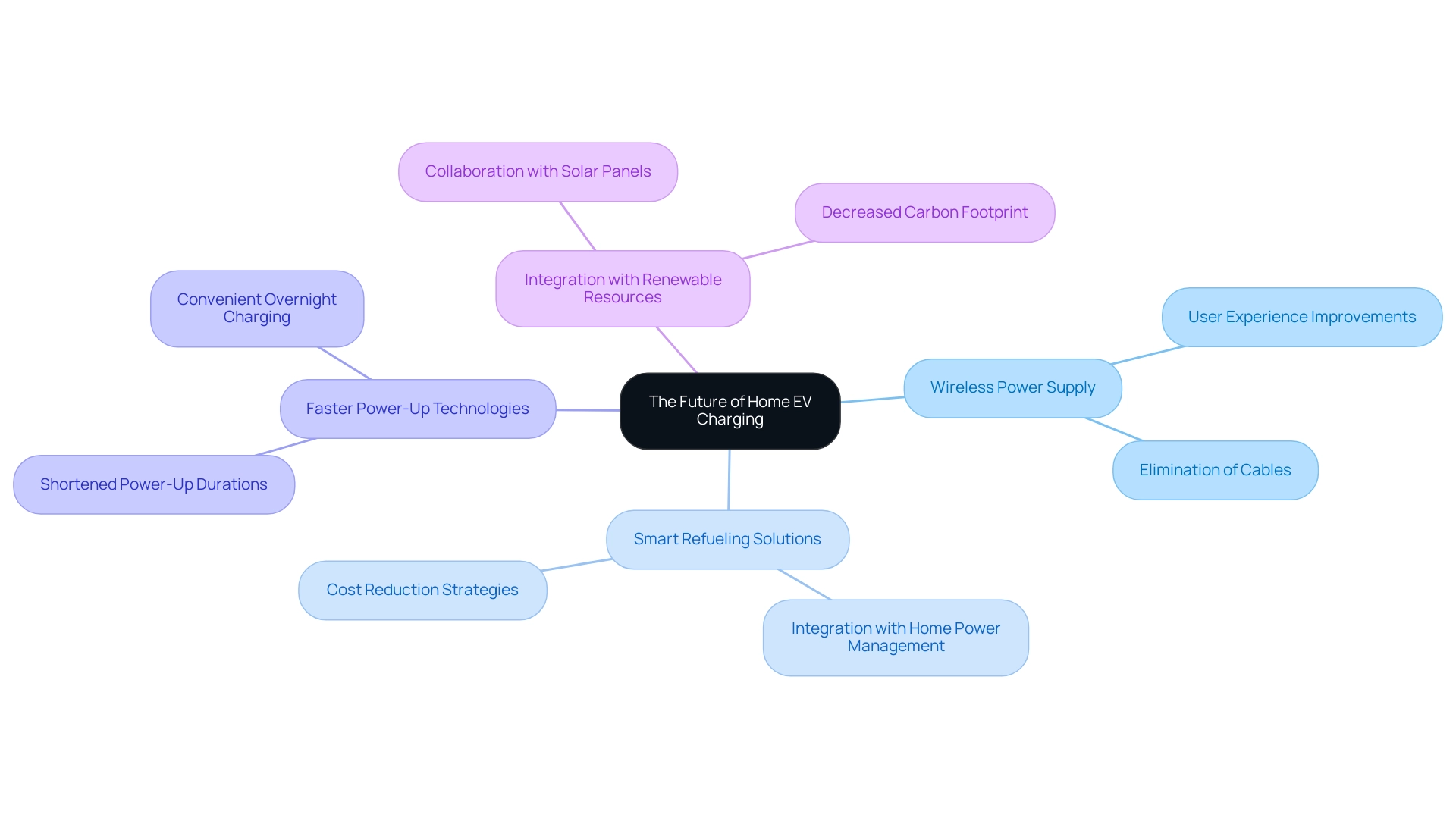Overview
As eco-conscious homeowners, we often find ourselves concerned about rising energy bills and the impact of our choices on the environment. Electric car charging points for home are not just a convenience; they are essential in nurturing a sustainable lifestyle. Imagine starting each day with a fully charged vehicle, ready for your adventures. This not only reduces your reliance on public charging stations but also brings financial peace of mind through tax credits and rebates. By investing in home charging, you are taking a meaningful step towards energy independence, enhancing your eco-friendly lifestyle while enjoying cost savings.
We understand that making such decisions can feel overwhelming. However, embracing home charging is a practical investment that aligns with your values and supports a greener future. Together, we can foster a community that prioritizes sustainability and empowers each other to make informed choices. Let’s work towards a brighter, more sustainable tomorrow, starting with the convenience and benefits of home charging solutions.
Introduction
As electric vehicles (EVs) surge in popularity, we understand that many environmentally conscious homeowners are concerned about their energy bills. The significance of home charging stations becomes increasingly evident, as embracing the convenience of charging at home not only streamlines daily routines but also offers substantial cost savings and a reduced carbon footprint.
With advancements in technology and a growing infrastructure, the landscape of EV charging is evolving, making it essential for homeowners to consider the implications of this shift. From understanding charger types to navigating installation processes and exploring financial incentives, the journey toward sustainable driving is filled with opportunities that promise to enhance your lifestyle while contributing to a greener future.
Together, we can embrace these changes and work towards a more sustainable future.
The Importance of Home EV Charging: Why Every Eco-Conscious Homeowner Should Consider It
Home EV charging is essential for eco-conscious homeowners, addressing a variety of concerns:
-
Convenience: Imagine starting each day with a fully charged vehicle right at home. This not only eliminates the hassle of frequent trips to public charging stations but also seamlessly integrates electric car charging into busy households’ daily routines.
-
Cost Savings: Home charging typically offers significant savings compared to public refueling options. By taking advantage of off-peak electricity rates, homeowners can further reduce their expenses. In California, for instance, Southern California Edison (SCE) provides a Charge Ready rebate of up to $4,200 for electrical panel upgrades, making residential electrification even more financially appealing. Additionally, combining solar panels with home charging can lead to even greater savings on utility bills, as solar power can both fuel your vehicle and lessen reliance on non-renewable sources.
The environmental benefits of using renewable energy sources, such as solar power for home charging, can significantly lower your carbon footprint. By choosing renewable energy, environmentally conscious residents contribute to a sustainable future while enjoying the perks of electric mobility, including the convenience of home charging. For example, solar water heaters not only provide hot water but also align with sustainability goals, enhancing your home’s eco-friendly profile.
- Power Independence: Home charging fosters a sense of energy autonomy, allowing homeowners to rely less on fossil fuels and public infrastructure. This independence is increasingly vital as California’s zero-emission vehicle market expands, with 1 in 4 Californians opting for zero-emission models over traditional gasoline cars. Powercore Electric, with its local expertise and commitment to sustainable energy solutions, can guide you through the installation of solar panels and home charging stations tailored to your needs.
The benefits of home EV charging extend beyond personal advantages; they also support broader environmental goals. For instance, federal tax credits for electric vehicles make the transition to EVs more accessible, offering incentives like a clean vehicle tax credit of up to $7,500 for new vehicles. This financial support encourages more homeowners to embrace electric vehicles, amplifying their positive environmental impact.
Furthermore, as highlighted by Qmerit, “Rated #1 in customer satisfaction, our expert network has installed over 450,000 EV refueling stations across the U.S. and Canada.” This statistic underscores the growing acceptance and reliability of residential power solutions.
In summary, the convenience, cost savings, environmental benefits, and energy independence associated with home EV charging make it a vital consideration for eco-conscious residents in 2025. Moreover, advancements in EV technology, like the emerging sulfur-crystal battery technology, could influence homeowners’ decisions regarding electric vehicles and power solutions, making this an exciting time for the EV market.
Types of EV Chargers: Level 1 vs. Level 2 and Beyond
When considering electric vehicle (EV) refueling options for your home, we understand that navigating the various charger types can be overwhelming. Let’s break it down together:
-
Level 1 Chargers: Utilizing a standard 120-volt outlet, Level 1 chargers are often included with your vehicle. While they offer the convenience of overnight power replenishment, they can take an extensive amount of time to fully energize your EV, sometimes requiring up to 24 hours. This can be a challenge for those of you with greater driving demands, making them less suitable for everyday use.
-
Level 2 Chargers: These chargers operate on a 240-volt outlet and significantly reduce the time needed to recharge your vehicle, typically achieving a full power-up in just 4 to 8 hours. This efficiency makes Level 2 chargers ideal for most homeowners, especially those who drive frequently or have multiple EVs. The growing trend in California reflects this preference, as evidenced by a 7.7% rise in EV power ports reported in Q3 2023, with a notable increase in Level 2 installations. Furthermore, the new national standards for federally funded EV stations unveiled in February 2023 emphasize the importance of adopting more efficient power solutions, aligning perfectly with the advantages of Level 2 chargers.
-
Level 3 Chargers: Also known as DC fast chargers, these are not typically used in residential settings due to their high cost and substantial power requirements. However, they deserve mention for their rapid power replenishment capabilities, often providing an 80% boost in just 30 minutes, making them suitable for commercial or public power stations.
As we look towards 2025, the benefits of Level 2 chargers become increasingly clear. They not only offer quicker power replenishment times but also align with the expanding accessibility of EV infrastructure. This is expected to grow considerably, with global lithium-ion battery manufacturing capacity projected to reach 3.2 TWh by 2030. This change underscores the importance of investing in effective residential refueling solutions, particularly electric car charging points for home, that can adapt to the evolving landscape of electric mobility.
For property owners eager to enhance their EV refueling capabilities, Powercore Electric is here to support you. We provide professional installation and maintenance services for electric car charging points for home, alongside solar panels and battery backups to create a comprehensive sustainable power solution. Our services are designed with eco-conscious homeowners in mind, ensuring that you can maximize your sustainable energy use. Together, we can make a positive impact on your energy habits. Reach out to Powercore Electric at (916) 699-8778 or via email at ryan.serrano@powercoreinc.net to learn more about how we can assist you in your journey towards sustainable driving.
Installing Your Home EV Charging Station: A Step-by-Step Guide
To successfully install your home EV charging station, let’s walk through these essential steps together:
-
Assess Your Electrical System: We understand that the first step can feel daunting. It’s important to consult a licensed electrician to evaluate your home’s electrical capacity. This assessment is crucial, as approximately 60% of homeowners may need to upgrade their electrical systems to accommodate electric car charging points for home, with costs ranging from $1,800 to $2,500. Understanding your current setup will help determine if any modifications are necessary. As car journalist Nick Kurczewski wisely advises, “Always ask before plugging in!”
-
Choose the Right Charger: Selecting a Level 2 charger that aligns with your specific needs is vital. Consider aspects such as power-up speed, installation space, and any extra features that may enhance your charging experience.
-
Obtain Necessary Permits: It’s common to feel overwhelmed by regulations, but checking local guidelines is essential to ensure compliance. Obtaining the required permits helps avoid potential fines and ensures the installation meets safety standards.
-
Install the Charger: When it’s time to install, engage a licensed electrician from Powercore Electric. Our team specializes in the installation of EV power stations and will securely mount the charger while properly connecting it to your electrical panel. We ensure that all safety protocols and regulatory standards are followed. The installation process generally includes a thorough site evaluation to determine the best position for the power station, potential electrical upgrades, and rigorous testing to ensure optimal functionality.
-
Test the Installation: After installation, it’s important to conduct a thorough test of the charger to confirm it operates correctly and safely. This step is vital to ensure that your investment functions as intended, providing reliable charging for your vehicle. Specific tests conducted during this phase include verifying electrical connections, ensuring proper grounding, and checking the charger’s performance under load.
Additionally, property owners can reduce EV charger installation costs by seeking incentives, researching options, and planning installations during renovations. According to HomeAdvisor’s Cost Data Methodology, understanding the pricing data reflects real-world project costs, enabling property owners to budget effectively for their improvement projects.
By adhering to these steps, you can guarantee a smooth installation process for electric car charging points for home, paving the way for a more sustainable and energy-efficient lifestyle. Together, we can make a difference! For more information about our services, including solar panels and battery backups, or to schedule an installation, contact Powercore Electric at ryan.serrano@powercoreinc.net or call (916) 699-8778.
Understanding the Costs: Installation, Electricity, and Incentives for Home Charging
We understand that the expenses related to setting up electric car charging points at home can vary significantly. Factors such as installation difficulty and necessary electrical enhancements play a crucial role in determining these costs. Here’s a detailed breakdown to help you navigate this important decision:
-
Installation Costs: Typically, the range for installing a residential EV power station falls between $800 and $2,000. This variation largely hinges on the specifics of the installation, including the distance from the electrical panel and whether a dedicated 240V circuit is needed. In some situations, upgrading to a 200-amp electrical panel may be essential to accommodate Level 2 charging, ensuring safety and future-proofing for additional electrification projects. With over 30 years of experience serving California, Powercore Electric is well-equipped to handle these installations efficiently and effectively, providing you with peace of mind.
-
Electricity Costs: Charging your electric vehicle at home generally incurs costs ranging from $0.10 to $0.30 per kWh, influenced by local electricity rates. For instance, residents of California can expect to pay an average of $0.20 per kWh. It’s crucial to consider these rates when calculating the total expense of charging at home, as they can significantly impact your budget.
-
Incentives: You can take advantage of various incentives to help offset installation costs. Federal tax credits for residential EV charger installation can cover up to 30% of the total expenses, significantly alleviating the financial burden. Additionally, many regional utility providers offer rebates that can greatly enhance your savings, making the transition to electric vehicle ownership more economical.
In conclusion, while the upfront cost for electric car charging points at home may seem substantial, the long-term savings on fuel and maintenance, combined with available incentives, make it a financially wise choice for environmentally conscious homeowners. As John Voelcker notes, it’s not just about the initial expenses, but how those expenses fit into a broader context of savings and convenience. Furthermore, Powercore Electric has received positive feedback from clients regarding their work and communication, reinforcing their reputation as a trusted choice for solar and electrical needs in California.
Their commitment to exceptional service and local expertise ensures that you receive unmatched quality craftsmanship and support throughout the installation process. Together, we can make this transition smoother for you. For more information or to schedule an installation, please reach out to Powercore Electric at ryan.serrano@powercoreinc.net or call (916) 699-8778.
Benefits of Home Charging: Convenience, Savings, and Sustainability
Home charging presents a wealth of advantages that resonate with both practical needs and sustainability aspirations:
-
Convenience: We understand that managing your electric vehicle (EV) charging can be a concern. Charging your EV at home allows you to benefit from overnight charging or off-peak hours, ensuring your vehicle is fully charged and ready whenever you need it. This flexibility is particularly appealing, as studies reveal that 80% of EV drivers appreciate the convenience of at-home power supply.
-
Cost Savings: It’s common to feel overwhelmed by rising energy bills. Home refueling is generally more economical than relying on public stations. By taking advantage of time-of-use rates, homeowners can significantly lower their electricity costs. Notably, the average acceptable premium for eco-friendly energy has decreased to just 7%, highlighting a growing preference for cost-effective, sustainable options. This trend underscores the financial benefits of residential power supply, especially concerning electric car charging points for home, making it an attractive choice for environmentally conscious homeowners.
-
Sustainability: We care about our planet, and incorporating solar power into your home energy system not only reduces your carbon footprint but also enhances your energy independence. Powercore Electric is committed to sustainability, offering energy-efficient solar systems designed to lessen reliance on non-renewable power sources. Garrett Fitzgerald, Senior Director of Research & Industry Strategy at Transportation Electrification, emphasizes that “the integration of power storage and demand-side flexibility is essential for maximizing the advantages of EV infrastructure.” By harnessing clean energy, you can charge your EV without depending on fossil fuels, contributing to a more sustainable future.
Installing electric car charging points for home can significantly enhance your property’s appeal. Homes equipped with power solutions are increasingly attractive to potential buyers, as the demand for sustainable living options continues to grow. By 2025, homes featuring electric car charging points for home are expected to see a notable increase in property value, making them a wise investment.
Real-world examples further illustrate these benefits. Consider NIO’s innovative battery swapping network, which has shown how convenient power solutions can elevate user experience and satisfaction. By providing accessible power options, NIO has positioned itself as a leader in the EV market, underscoring the importance of convenience in shaping consumer preferences. Their approach highlights how efficient power supply infrastructure can greatly enhance the overall experience for EV users.
At Powercore Electric, we pride ourselves on delivering unmatched quality craftsmanship and a customer-first approach. Our team is dedicated to ensuring your EV installation meets the highest standards while contributing to a greener future. Don’t just take our word for it; our satisfied customers have shared their positive experiences with our services, emphasizing the seamless process and exceptional results.
In summary, the advantages of residential EV power supply extend beyond mere convenience; they encompass significant cost savings, sustainability benefits, and increased property value, making them an essential consideration for eco-conscious homeowners. Together, we can work towards a more sustainable and cost-effective future.
Maximizing Your Home Charging Experience: Tips for Efficient Usage
To enhance your home charging experience with Powercore Electric’s EV charging stations, we invite you to consider these best practices that can ease your concerns about energy costs and sustainability:
- Charge During Off-Peak Hours: We understand that electricity bills can be a burden. By charging your EV during off-peak times, you can take advantage of lower rates, significantly reducing your costs. Statistics show that charging during these hours can lead to substantial savings. In fact, EV power supply generated approximately $1.7 billion more in revenue than utility costs in certain US service territories, highlighting the financial benefits of efficient power practices.
- Avoid Full Charges: It’s common to want to charge your vehicle to 100%, but aiming for about 80% can greatly enhance your battery’s longevity. This simple adjustment not only extends the life of your battery but also helps maintain its efficiency over time, giving you peace of mind.
- Regular Maintenance: To ensure your power station remains in optimal condition, keeping it clean and routinely checking for wear and tear is essential. Regular maintenance can prevent potential issues, ensuring reliable performance and your continued satisfaction.
- Use Smart Chargers: Investing in smart chargers can transform your power replenishment experience. These devices allow you to plan charging times and track usage, providing insights that help optimize your consumption. Remember to refresh your power rate in the application to guarantee precise expense monitoring for your home charging sessions.
- Stay Informed on Infrastructure Growth: As the number of electric car charging points for homes in the US increased by 29% from 2021 to 2022, understanding this growing infrastructure can empower you to make informed choices about your refueling practices. Alejandro Moreno from the Department of Power emphasizes that “the ability of demand flexibility to provide critical services to the grid is essential,” underscoring the importance of efficient resource management.
By applying these methods, you can enjoy a more efficient and economical electric vehicle refueling experience with Powercore Electric, contributing to both your autonomy and sustainability goals. Together, let’s explore how Powercore Electric’s solar panel and battery backup solutions can further enhance your residence’s energy efficiency. For more information on our EV power stations and how they can benefit you, please contact Powercore Electric today!
Troubleshooting Common Issues with Home EV Charging Stations
Frequent problems with residential EV power supply units can significantly impact your experience. We understand that navigating these issues can be frustrating, so let’s explore some common challenges and expert advice on how to overcome them:
-
Charger Not Powering On: If your charger isn’t powering on, first check the circuit breaker to ensure it hasn’t tripped. Additionally, confirm that the charger is securely plugged into the outlet. If the issue persists, inspect the power source for any faults. Remember, it’s common to feel overwhelmed, but these simple checks can often resolve the problem.
-
Slow Powering Speeds: Experiencing slow charging speeds can be disheartening. To address this, verify that you are using the right charger type for your electric vehicle (EV). It’s also crucial to ensure that your home’s electrical system can support the charger’s requirements. Sometimes, upgrading to a higher amperage circuit is necessary for optimal performance, which is part of the comprehensive electrical upgrades offered by Powercore Electric. Together, we can ensure your charging experience is as efficient as possible.
-
Inconsistent Power Supply: Inconsistent power supply can arise from various factors. Take a moment to examine the power cable for signs of wear or damage, as this can disrupt the connection. Ensure that all connections are secure and free from debris. We understand that these issues can be concerning, but with a little attention, they can often be resolved.
-
Software Updates: Some EV chargers require periodic software updates to function correctly. It’s a good idea to check the manufacturer’s website for any available updates and follow the provided instructions. Keeping your charger updated can enhance its efficiency and reliability.
-
Real-World Examples: For instance, a homeowner in California faced slow replenishment speeds due to an outdated electrical panel. After upgrading to a modern panel through Powercore Electric’s installation services, the power transfer speed improved significantly, demonstrating the importance of having a compatible electrical system. This shows that with the right support, positive changes are possible.
-
Statistics on Charger Power Issues: Recent data indicates that nearly 20% of EV owners report issues with refueling speeds, highlighting the need for proper installation and maintenance practices. As the global lithium-ion automotive battery manufacturing capacity is anticipated to reach 3.2 TWh by 2030, the demand for effective power solutions will only rise. Understanding these trends can empower you to make informed decisions.
-
Expert Insight: As Jeff S. Bartlett, managing editor for the autos team at Consumer Reports, notes, “Reliable EV power supply is crucial for enhancing user experience and encouraging adoption.” This underscores the importance of proactively addressing these common issues, and we’re here to help you navigate them.
By tackling these frequent concerns in advance, you can enhance your experience with electric car charging points at home, ensuring dependable and effective usage. Powercore Electric is dedicated to transparency and community focus, making us a trusted partner in your journey towards electric vehicle ownership. For more information on installation services, including site assessments and electrical upgrades, please reach out to Powercore Electric at ryan.serrano@powercoreinc.net or call (916) 699-8778. Together, we can work towards a more sustainable and efficient energy future.
The Future of Home EV Charging: Innovations and Trends to Watch
The future of residential electric vehicle power supply is indeed promising, driven by a wave of innovative technologies and trends that aim to enhance convenience and sustainability. We understand that many homeowners are concerned about rising energy bills, and these advancements could be the answer to your worries:
-
Wireless Power Supply: Cutting-edge developments in wireless power technology are paving the way for solutions that eliminate the need for cumbersome cables. This advancement not only streamlines the refueling process but also improves the user experience, making it as easy as parking your vehicle.
-
Smart Refueling Solutions: Imagine a world where the integration of EV stations with home power management systems transforms your power consumption. These intelligent systems will enhance power-up durations based on rate fluctuations, allowing you to reduce expenses while ensuring your vehicles are powered when demand is minimal.
-
Faster Power-Up Technologies: Innovations in power-up technology are increasing, with new methods anticipated to significantly shorten power-up durations. This means that property owners like you can take advantage of the ease of faster power sessions, facilitating the ability to recharge your vehicles overnight or during brief pauses.
-
Enhanced Integration with Renewable Resources: As more property owners embrace solar solutions, such as those provided by Powercore Electric, the collaboration between solar panels and EV power systems will become progressively prevalent. This integration not only supports sustainability but also enables residents to use clean power for their vehicles, further decreasing their carbon footprint. Powercore Electric offers extensive services, such as solar panels, battery backups, and EV stations, ensuring that eco-conscious property owners have access to the finest solutions for their needs.
These advancements signify a wider trend towards smarter, more efficient residential energy solutions, allowing you to fully benefit from the changing landscape of electric vehicle technology, especially through the use of electric car charging points for home. Innovative instances, such as GRIDSERVE’s electric forecourts in the UK, demonstrate the evolution of EV refueling hubs, while Powercore Electric’s 30 years of service underscores the importance of reliable providers in this area. Furthermore, analysts from Goldman Sachs predict a decline in costs, reaching USD 80 per kWh by 2026, highlighting the economic benefits of adopting these new technologies.
Global trends, such as Sweden’s plans to electrify highways by 2025 and France’s proposal for nearly 5,000 km of Electric Road systems by 2030, reinforce the relevance of electric car charging points for home in a rapidly evolving market. Together, we can embrace these changes and work towards a more sustainable future.
Conclusion
We understand that many homeowners are concerned about rising energy bills and the impact of their choices on the environment. The shift towards home EV charging represents a significant opportunity for eco-conscious individuals looking to enhance their sustainability efforts while enjoying practical benefits. Imagine the convenience of charging your vehicle at home, saving on energy costs, and contributing to a greener future—all at once.
By opting for home charging stations, you can streamline your daily routines and embrace a more sustainable lifestyle. Understanding the types of chargers available, such as Level 1 and Level 2, along with the installation process and associated costs, equips you with the knowledge needed to make informed decisions. With incentives and rebates available, the initial investment in home charging can lead to substantial long-term savings and increased property value.
As technology continues to evolve, innovations such as wireless charging and smart energy management systems are poised to further enhance your home charging experience. These advancements not only promise greater efficiency but also align with the growing trend of renewable energy integration. It’s common to feel overwhelmed by these options, but together we can navigate this journey towards energy independence.
In conclusion, investing in a home EV charging station is not merely a practical choice; it is a heartfelt commitment to a sustainable lifestyle that benefits both you and the environment. By embracing this transition, you can play a pivotal role in shaping a cleaner, more sustainable future for generations to come. Let’s work towards this goal together, fostering a community that values both personal well-being and the health of our planet.
